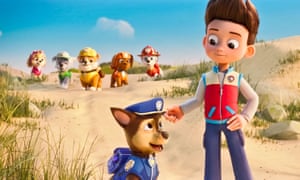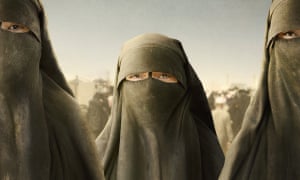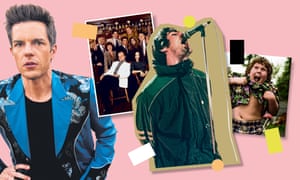Puppet pups: is PAW Patrol authoritarian propaganda in disguise?
As a new film of the kids’ cartoon hits cinemas, the puppies’ popularity has made it a fascinating case study for the cultural politics of a generation

Bad news for parents of children under the age of seven this week: PAW Patrol: The Movie has landed on UK screens, all the better to spoon-feed a generation of Covid-hardened kids with authoritarian neoliberal propaganda in the guise of an upbeat cartoon about puppies. That’s right: the early years TV show that criminology professor Liam Kennedy suggests is complicit in “a global capitalist system that produces inequalities” is back!
PAW Patrol’s astonishing popularity has made it a fascinating case study for the tastes and cultural politics of a generation. The show’s move from small to silver screen has highlighted many of those peculiarities. The first thing to say – though it seems obvious – is that parents can’t simply leave their children in front of PAW Patrol: The Movie, as you might with a television show. Perhaps because the film-makers know adults will be watching, it has somewhat dialled down its usually frantic goings-on. Indeed, a somewhat pointed early scene in the film involves a fireworks display in which all the rockets go off at once in a pandemonium of colours and noise, and the man in charge says: “Hey – I’m trying to build momentum here.”
Adults may be relieved with this odd bit of downtime, but in general the film maintains the programme’s deathless vibrancy, a world in which everybody is alert and ready at all times, and where dreaming and imagining are likely to get you run over by a screeching car. This seems of a piece with a modern culture in which children are evidently overly stimulated and connected.
PAW Patrol’s chief singularity is the way young people are called upon to rectify the mistakes or crimes of adults. Ryder, Charlie to the pooches’ Angels, is a 10-year-old vigilante, and in the new film has become a magnate at the head of a lucrative empire. The animals themselves, the movie reminds us, are conspicuously not dogs but puppies – never ageing, like Bart Simpson or Just William. This is important, because it aligns with a sensibility in which youth, unclouded by ambition or other adult considerations, is able to save the day over and over. Perhaps this is pleasing or recognisable to children brought up by late millennials having to become adults in a world where traditional markers of ageing (such as house ownership) are shifting. Also, children raised post-Philippa Perry are probably used to being considered on a more equal footing to grownups than previous generations.
PAW Patrol: The Movie works quite hard to repair some of the most obvious damage of the series, in which only one of the super-pups is presented as female. (Skye is depicted as so girly that not only is her uniform hot pink, but, freakishly, her eyes are too – the properties of biology clearly coming second to gender essentialism in the movie’s universe.) The film introduces a new female character, Liberty (finely voiced by Marsai Martin – the film’s best asset). It remains to be seen if Liberty will become canon: another female puppy, Everest, appears a number of times in the show but is kept to the sidelines. Liberty is a decent enough character, although why this streetwise ragamuffin would yearn to join the ranks of these narcs is unclear. In the end, she is fitted with an apricot-pink outfit of her own.
The film’s dismaying gender politics are in tune with the franchise’s gross rightwingery, which sees these privatised dog-Avenger types endlessly called upon to undo the failings of various functionaries. A sort of Ayn Randian objectivism prevails in the film, visible most queasily when Chase (the most cop-like of the lot, in his blue uniform and police car) is told that he was “born to be a hero”. The film draws amusing parallels between the pups’ antagonist, Mayor Humdinger, and another blond North American megalomaniac, right down to the grotesque tower that Trump – I mean, Humdinger – erects in his own honour. But the film’s own sensibility is not vastly different to Trumpian individualism, disdain for the state, and capitalist materialism – indeed, in the film the dogs have a new tower of their own, subsidised by selling merch, and come with gleaming luxury gadgets that make Liberty, the poorer dog, swoon with envy.
How PAW Patrol will come to be viewed in years to come is an interesting question: it seems likely that a generation of children coming-of-age in a time of far greater gender fluidity than ever, will have little time for the show’s patriarchal gender performance. In other words, abandoning their children to this ceaselessly cheery neoliberal nightmare for 90 minutes shouldn’t worry parents too much.
PAW Patrol: The Movie is released on 13 August in cinemas.



